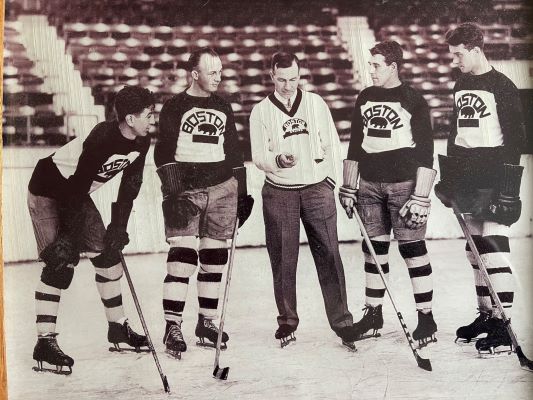
By Tim Dumas: | Follow me on Twitter @TimDumas
Many Bruins fans – more than 50 years later – still lament a missed opportunity at a possible dynasty. Or at least a three-peat.
A year after Bobby Orr flew into Stanley Cup glory on Mother’s Day, the Bruins tore through their 1970-71 season. They accumulated a then-NHL record of 399 goals and team marks of 57 wins and 121 points (both broken this month), only to be stonewalled by the Montreal Canadiens and rookie goaltender Ken Dryden in the opening round of the playoffs.
While the Bruins won the Cup the following season, the disappointment from ‘70-71 still resonates because of how dominant that team was and the opponent that eliminated them.
A similar scenario played out 41 years prior.
The 1929-30 Bruins, in just their sixth NHL season, featured attributes akin to the ‘70-71 team: a supreme defenseman (Eddie Shore); regular-season supremacy (38 wins in just 44 games); a league-leading offense; defending Cup champions; and multiple Hall of Famers – seven, in addition to coach Art Ross.
The Depression-era Bruins took advantage of new rules that season, which permitted forward passing for the first time. Because goal-scoring jumped so quickly, the offsides rule was implemented mid-season, but the Bruins were hardly limited, netting a then-record 179 goals, 37 more than the Montreal Canadiens, their closest competitor.
With players nicknamed Cooney, Tiny, Dutch, and Dit, the Bruins won 14 consecutive games, a record that stood for 52 years. Their win-total record remained intact for 21 years, but it took a 70-game season for the Detroit Red Wings to eclipse the mark. Most impressive, the Bruins’ .875 winning percentage is a record that will likely never be approached, let alone surpassed.
The team was 85 percent Canadian, with just two players from the United States: Bob Taylor of Newton and Myles Lane from Melrose.
Ralph “Cooney” Weiland led the league with a record 73 points (the old mark had been 51). Cecil “Tiny” Thompson played every minute in goal, the norm for that period, and put up a 2.19 GAA and won Vezina Trophy. (Incidentally, Thompson was no shorty; he was 5-foot-10 and earned the facetious nickname as a teenager).
Aubrey “Dit” Clapper totaled 41 goals and, along with James “Dutch” Gainor and Weiland, made up the “Dynamite Line,” which exploded for a combined 102 tallies. The Bruins’ back line was manned by Shore and Lionel Hitchman, who helped limit opponents to a league-low 98 goals.
But the B’s did not with the Cup. After defeating the Montreal Maroons three games to one in what was called the NHL semifinals, Boston faced the Canadiens in the finals.
The Bruins hadn’t lost consecutive games all year and defeated the Canadiens in all four of their regular-season meetings, but the Habs won Game 1, 3-0, behind goalie George Hainsworth. The Bruins fell behind 3-0 in the second game and lost again, 4-3, ending the series as the Canadiens finished the playoffs with a 6-0 record.
It was the first time the Stanley Cup was presented on the ice, and the brief finals series prompted the league to change the championship round to a best-of-five format the next season. The Bruins – with Weiland, Clapper, Thompson, and Shore still in the lineup – needed another nine seasons to capture the Cup again. By then, Milt Schmidt, Bobby Bauer, Woody Dumart, and Frank Brimsek were embarking on Hall of Fame careers.
The ‘29-30 team was loaded with Hall of Famers Thompson, Weiland, Clapper, Shore, Harry Oliver, Marty Barry (18 goals that season), and Mickey MacKay, who was in his second and final season with Bruins and appeared in just 147 NHL games, his career played mostly before the league was born.
The coach was Art Ross, who was inducted as a player, although he won 387 games and two Cups behind the bench. He died in Melrose in 1964. Surprisingly, Hitchman is not in the Hall of Fame, but his No. 3 was the first number retired by the Bruins in 1934.
The 1929-30 season wasn’t the only season that ended with a stunning playoff loss to the Canadiens, but it is the most forgotten. All the records the Bruins set are still worth remembering.


Leave a Reply